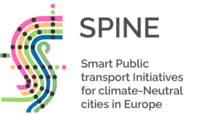SPINE
SPINE aims to accelerate progress towards climate neutrality by integrating public transport systems with new mobility services, sharing schemes, active transport modes, and micromobility.

About the project
SPINE sees smart Public Transport as a necessary piece of the climate transition puzzle. Through a network of collaborative Living Labs (LLs), the project will work to foster transferability that applies an intersectional view of transport system users. With this equity-centered approach, SPINE aims to create more efficient, sustainable, resilient and inclusive public transport systems.
Co-creation activities will take place in the four Lead City LLs - Antwerp, Bologna, Tallin, and Las Palmas - where multiple stakeholders will help inform the development of efficient, replicable, and socially acceptable innovative mobility solutions.
The SPINE approach involves the creation of:
- innovative simulation and Digital Twining (DT) tools, along with open data and behavioural models, that will allow the building of scenarios combining different mobility interventions and the implementation of the most promising ones;
- data-driven impact assessment models that will foster the twinning, transferability and adaptation of the successful solutions of the four LLs in seven Twining Cities.
The successful solutions developed in the four LLs will be adapted and transferred to seven Twining Cities – Barreiro, Valladolid, Zilina, Sibenik, Heraklion, Gdynia, and Rouen.
SPINE sets an ambitious plan for the co-design and implementation of 55 smart, sustainable and inclusive mobility solutions.
Cities
Fast Facts
January 2023 - December 2026
Project duration
39 partners
Project partners
€ 17,020,516
Project funding



















































